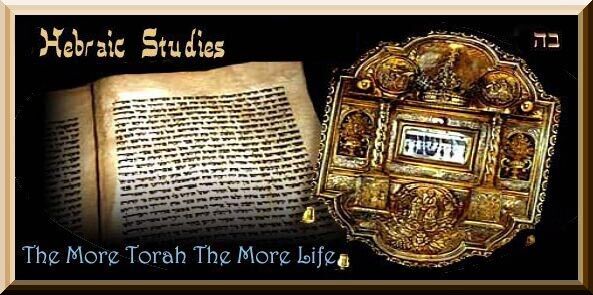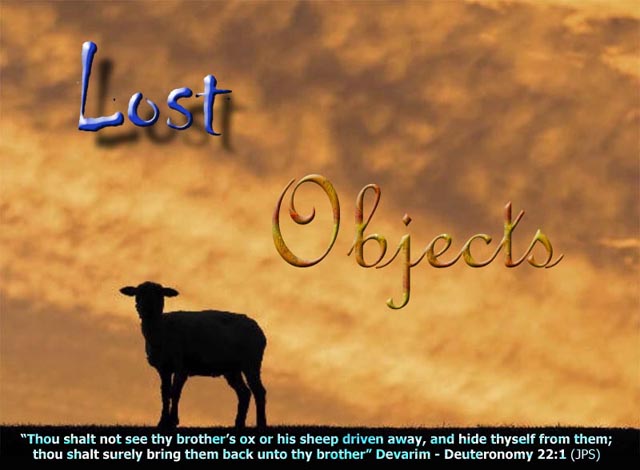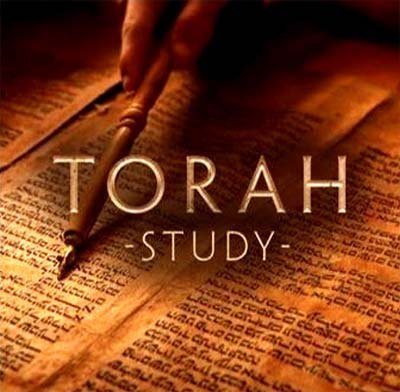Hebraic Studies – Lost Objects
Please Note: Firefox and some other search engines are not suitable
Use Google Chrome for this page to load perfectly!

Please do NOT visit this site on Shabbat or on a
Please
Note: On this
page I may show the four letter blessed *“Memorial Name” of the Almighty in
Ivrit - ![]() - Y-H-V-H, which we usually pronounce as
“Adonai” or “HaShem”. At all times
treat the most blessed Name with sanctity and when we even see the Name, we
should say “blessed be His Sanctified Name.”
- Y-H-V-H, which we usually pronounce as
“Adonai” or “HaShem”. At all times
treat the most blessed Name with sanctity and when we even see the Name, we
should say “blessed be His Sanctified Name.”
*“This
is My Name forever, and this is My memorial to all
generations.” Shemot - Exodus 3:15.

On this site I
will mostly use a version based on the “Jewish Publication Society”
Only changes are the blessed Names are included as was written originally, until men removed it!
With
It is my joy assisting those who may for
whatever reason may have wandered away from the faith and believe me I am well
aware that the world has so much on offer that will draw many away. Of course
there are things out there that will seem to be so enticing, but sadly in the end, more often than not much of what seems so good is
really far from the truth for often it tends to lead us to sadness and even
trouble. Thus, why not head the call and “Return to our Elohim”, blessed be He!
It is written in the Tanakh, as you may have
seen above in the title logo, and this entire study is actually based wholly on
that verse;
Then there is another verse in Shemot - Exodus chapter 23 that does not speak of “thy brother’s ox or his sheep” but of “thine enemy’s” animals, etc.
“If
thou meet thine enemy's ox or his ass going astray (
Let me comment on these two verses as follows.
The verse in Devarim Deuteronomy uses the
expression “Nidachim” which means
“wandering far,” whilst the expression “
Although it speaks of animal, such as an ox, donkey, but the reason the word “sheep” is also used frequently in the Torah in order that it will bring to mind the idea of “a lost sheep.” With this in mind, let us reflect as follows. The Word of our Elohim, blessed be He, shows that He cares about us and our property and things. Thus we see that in the Word He even takes pity on an individual’s donkey or a sheep that may have wandered from the path and that may require great effort to be brought back on the right course.
Therefore, how much more so should we care for a single Jew who has wandered from their faith in some way or even much more, Elohim forbid. It is our responsibility even if it takes great effort to assist them and bring them back on right course. We are now already acquainted with the verse; “You MUST RETURN them to your brother.” And that was just for an animal, therefore how much more so for a wonderful Jewish person!
May I comment of the fullness of this statement; “thou shalt surely bring them back unto thy brother” or in more modern English it really says “you MUST return them,” the implication in the Word is, even a hundred times if necessary. From this, we can learn a lesson in our case as well, namely that we must toil even one hundred times to bring one who has wandered from the path and assist them back to our beloved Elohim the Creator of Heaven and Earth.
Sadly, the truth is that there are also those
that have wandered from the path mostly due to false teachers who have led them
astray. And thus they are just like lost sheep who do not know how to return to
their Master’s Home. Therefore, there is a great duty to show and teach
them the correct way to return again to ![]() our Elohim, blessed be His Sanctified Name,
for He told us;
our Elohim, blessed be His Sanctified Name,
for He told us;
“And thou shalt teach them the statutes and the laws, and shalt show them the way wherein they must walk” Shemot - Exodus 18:20 (JPS).

Only by returning to reading the Torah/Tanakh will it brings us to love Elohim for it says in the Torah;
“You shall love ![]() your Elohim with
all your heart, with all your soul, and with all your strength”
Devarim - Deuteronomy 6:5 (JPS).
your Elohim with
all your heart, with all your soul, and with all your strength”
Devarim - Deuteronomy 6:5 (JPS).
![]()
"Va’hav’ta
Et ![]() (YHVH)
Elohey'cha"
(YHVH)
Elohey'cha"
Then verse 6 states the following;
“And these words, which I command thee this day, shall be upon thy heart.”
The following is my somewhat simplified explanation of why these two verses are placed together.
It is known that some characteristics are intrinsic (inherent, or built in) to an object and some are extrinsic (alien). Suppose an iron rod, or a saucepan sits on a high flame on a fire. When this happens, it takes on so much heat from the fire that anything touching it will be burnt. Nonetheless, the heat that passes through it has an external source, unlike the fire itself, which is intrinsically hot. The difference between the two is that the heat in the pot or piece of iron exists only in the object itself. When another pot or a piece of iron is put next to the first, the first pot does not have enough energy to heat up the second. Moreover, the iron pot will only remain hot as long as it rests on the fire. Once it is removed from the fire, the heat will slowly leave it until it is totally cold. This is all because the heat in it has an outside source. As for the fire itself, it will remain hot even if it is left alone for several hours or days, unless of course, it is put out. Furthermore, fire has the power to heat up other things.
It is the same with the powerful Word of ![]() Elohim, blessed be
His Sanctified Name, which is compared to FIRE. Elohim said;
Elohim, blessed be
His Sanctified Name, which is compared to FIRE. Elohim said;
“Is not my Word like fire?” Yirmyahu -
Jews who continue in faith love to continually study the Torah and have their thoughts focussed on the treasures that are contained in it, and believe me His Word will deeply touch our hearts. Therefore all of the Tanakh will have the power to endear and change your life, which is good for you and those others who are near you at any given time. For living right will always touch others, for you will be different and people will notice it, and Elohim willing it will touch their hearts!
Those who due to work or other commitments, who are not able to spend as much time studying the Torah and they should seek out good and faithful Scripture based teachers and learn from them. This in itself is good, fulfilling a positive command “Cleave to him” (Devarim - Deuteronomy 10:20). Cleave first to Elohim, but also to those whom the Spirit of Elohim has been given, such as the gift of teaching. We should feel uplifted whilst we are listening to Torah teaching. For this will keep the fire of faith burning within us, at all times!
Let us return to that question. “Love
![]() your Elohim”
(Devarim - Deuteronomy 6:5). The Word uses the perfect Hebrew form of love,
“VeAhavta” and this teaches us to
endear Elohim to others! How are we supposed to achieve this desire of
endearing Elohim to others? The verse continues, “These words should
be ... on your hearts” Devarim - Deuteronomy 6:6. This means that you
yourself should know the Word, for it should be in your heart and we do this by
living a life of a good example!
your Elohim”
(Devarim - Deuteronomy 6:5). The Word uses the perfect Hebrew form of love,
“VeAhavta” and this teaches us to
endear Elohim to others! How are we supposed to achieve this desire of
endearing Elohim to others? The verse continues, “These words should
be ... on your hearts” Devarim - Deuteronomy 6:6. This means that you
yourself should know the Word, for it should be in your heart and we do this by
living a life of a good example!
If you yourself do not spend much time reading and studying the Torah, then sadly we will be devoid of its fullness and you will be unable to arouse His in others. You might think that after commanding us to love Elohim and His Word, (Devarim - Deuteronomy 6:5); it would have been enough to immediately go on with the words … “Teach them to your sons and speak about them” verse 7. Why do we need the middle verse about keeping these words “on your heart?” The explanation is simple.
It is normal for people to keep their pots and pans in the kitchen pantry and to keep the decorative objects in the lounge and living areas. If a family member found the pots and pans in the living room, he would quickly remove them if guests approached the house. It would be silly to leave them in the lounge and it would be considered to be untidy and crazy by all.
It is considered that the heart is the king of all the organs of the body, containing as it does the essence of life. Shlomo said;
“Above all that thou guardest
keep thy heart; for out of it are the issues of life” Mashley
Let me rephrase it in a more simple language;
“Guard your heart with the greatest vigilance, for life issues forth from it”.
There we find the faculties of thought. The stomach by contrast, is merely the receptacle of food and drink. Therefore, also, it is known that the Tanakh is the most important of Elohim’s gifts. “In the beginning Elohim created the heaven and the earth” (Bereshit - Genesis 1:1). Everything to do with food was created later. For example, on the third day of Creation, Elohim said, “Let the earth put forth grass” (verse 11). On the sixth day, He said, “Let the earth bring forth the living creature after its kind, cattle, and creeping thing, and beast of the earth after its kind.' And it was so” (verse 24). Therefore, it is certainly fitting that the Word of Elohim, given unto us all, the choicest of all creations should rest in man’s heart all the time. For “Elohim created man in His own image” (verse 27). And finally we read; “And Elohim saw everything that He had made, and, behold, it was very good. And there was evening and there was morning, the sixth day” (verse 31). And we know that He rested on the Seventh Day, giving us our blessed Sabbat!
Other more mundane matters having to do with food should only occasionally enter his thoughts. When we take a good look at ourselves, it turns out that we do exactly the opposite. The main things we tend to think about are eating and drinking and our physical needs. Only occasionally (in comparison) do we think about His Word and doing His will! Thus being a bit like the person that leaves the pots and pans in the living room whilst entertaining guests. This is why Elohim, blessed be He, reminds us,
“These things ... should be upon your heart.”
These things being specifically, sharing the Torah/Tanakh, and doing good deeds for remember this truth … Our faith should be constantly at the forefront of our lives as Jews and all other worldly concerns should be well after other things like Mishpacha (family), Etc.
May we constantly learn from the Word of Elohim and this study commenced with,
“Thou shalt not see thy brother’s ox or his sheep driven away (Nidachim), and hide thyself from them; thou shalt surely bring them back unto thy brother” Devarim - Deuteronomy 22:1 (JPS).
“If thou meet thine enemy's ox or his
ass going astray (
I trust as we have been reading this study He will give you understanding of what this is all about. And what has our Elohim said unto those who need to return unto Him?
“Return unto Me, saith
![]() of hosts, and I will
return unto you” Zecharyah - Zechariah 1:3 (JPS).
of hosts, and I will
return unto you” Zecharyah - Zechariah 1:3 (JPS).
I trust that this study has inspired you to a closer relationship with our Creator who has given us so much. Thus let us now in return to Him give more of ourselves, thinking less of our own self, and more of Him and the needs of others, therefore spending less time on our physical needs pleasure and entertainment, etc, and spend more time on spiritual matters. How often must it be said, “Time is urgent”, especially in these times of a worldwide pandemic, with so many ill and yes sadly so many dying due to Covid-19. Remember no one knows when that day comes, thus do not waste the time we have, for now is the time to;
“And thou shalt love the LORD thy God with all thy heart, and with all thy soul, and with all thy might” Devarim - Deuteronomy 6:5 (JPS).
“But whoso hearkeneth unto me shall dwell securely, and shall be quiet
without fear of evil”
As you go may the Spirit of Elohim, blessed be
He, touch and change your life abundantly, and may your life be full of
everything that is good!

And remember our motto seen on the logo at the
top of this page: “The More Torah, the More Life”, for ![]() Elohim, blessed be His Sanctified Name, is the
one who gave us our Life!”
Elohim, blessed be His Sanctified Name, is the
one who gave us our Life!”
Rabbi
![]()
Return to our MAIN PAGE or go to
our Main Index


